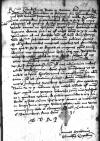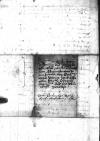List #722
Jan MECKLER do Ioannes DANTISCUSKulmsee (Chełmża), 1531-12-06
| odebrano Regensburg, [1532]-04-06 Rękopiśmienne podstawy źródłowe:
Pomocnicze podstawy źródłowe:
| ||||||
Tekst + aparat krytyczny + komentarzZwykły tekstTekst + komentarzTekst + aparat krytyczny
Reverendissimo in Christo Patri et Domino, domino
Reverendissime Colendissimeque Pater et Domine, domine gratiose dignissime.
Post humilem et devotam sui commendationem me Vestrae Reverendissimae Paternitati obsequiosum reddo.
Reverendissime Domine.
Licet iam pridem superioribus cf.
Novi Vestrae Reverendissimae Paternitati communicare queo nihil, tantummodo quod omnes hic apud nos propria libertate (omni iure posthabito) gaudere volunt. De quibus permulta Vestrae Reverendissimae Paternitati scribenda essent.
Cum his Vestram Reverendissimam Paternitatem sanam et incolumem in longissima tempora valere exopto. Cui me unice commissum dedo et elargior.
Datum
Eiusdem Vestrae Reverendissimae Paternitatis


 AAWO, AB, D. 67, f. 104v
AAWO, AB, D. 67, f. 104v